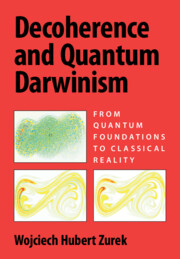
- Publisher:
- Cambridge University Press
- Online publication date:
- March 2025
- Print publication year:
- 2025
- Online ISBN:
- 9781009552868

The measurement problem has been a central puzzle of quantum theory since its inception, and understanding how the classical world emerges from our fundamentally quantum universe is key to its resolution. While the 'Copenhagen' and 'Many Worlds' interpretations have dominated discussion of this philosophically charged question, Zurek builds on the physics of decoherence and introduces the theory of 'Quantum Darwinism' to provide a novel account of the emergence of classical reality. Opening with a modern view of quantum theory, the book reconsiders the customary textbook account of quantum foundations, showing how the controversial axioms (including Born's rule) follow from the consistent core postulates. Part II discusses decoherence and explores its role in the quantum-to-classical transition. Part III introduces Quantum Darwinism, explaining how an information-theoretic perspective complements, elucidates, and reconciles the 'Copenhagen' and 'Many Worlds' interpretations. This insightful book is essential reading for any student or researcher interested in quantum physics.
‘A magnificent, defining work by the foremost authority on the transition from quantum to classical. Over the past forty years, Zurek has put forward one groundbreaking idea after another about how interactions of quantum systems with their environment explain the many puzzling aspects of the emergence of classical behavior. His guiding principle, ‘let quantum be quantum,’ has turned out to be the key to unlocking the secrets of how quantum systems effectively become classical. The theories he has developed, from einselection to quantum Darwinism, have led to a seminal shift in our understanding of the quantum-to-classical transition and have been confirmed time and again in the laboratory. Written in an impressively engaging and accessible style, the book is the definitive text on all aspects of the quantum-to-classical transition. It will be an indispensable companion for anyone interested in modern quantum mechanics, from students to researchers.’
Maximilian Schlosshauer - University of Portland
‘Physicists puzzled by the fate of Schrödinger’s cat are often advised, tongue in cheek, to ‘shut up and calculate’. If they are not satisfied by this commandment, they will be inspired by Wojciech Zurek’s new book. The ideas of this pioneer of quantum information theory about environment induced decoherence and physical reality are exposed here with great clarity. Starting from the quantum postulates, Zurek guides us along a path across the elusive quantum to classical boundary, masterfully describing every step, avoiding circular reasoning, answering frequently asked questions about superpositions, measurement and entanglement. With his Darwinian metaphor describing the survival of the fittest ‘pointer states’ in a huge quantum space, Zurek proposes a thoughtful reconciliation between Bohr’s Copenhagen credo and Everett’s many-world picture. This timely book to mark the 100th anniversary of quantum mechanics is readable at many levels. It will be a gem for teachers and for graduate students eager to understand quantum physics better.’
Serge Haroche - Collège de France
‘Zurek’s book is a coherent synthesis of various advances he has made in addressing the irritating unsolved question of the measurement in quantum mechanics. Quantum Darwinism claims to solve the problem by accounting for our perceptions. What I like is that it does not invoke a magic influence of our brain onto the observed quantum object. Wojciech Zurek rather asks the question of what kind of consensus various observers can gain from their observations of a system. He takes the example of a massive object whose position is observed thanks to a stream of photons. I have not dwelled deep enough in that book to evaluate how much it will allow me to progress in my understanding of the relationship between the microscopic quantum world and the macroscopic classical world, but there is no doubt that it is a stimulating book that should be read by anybody who feels concerned by the problem.’
Alain Aspect - Institut d’Optique, Université Paris-Saclay, France
‘Zurek explains the emergence of classicality from quantum laws in the important special case of a body immersed in an out-of-equilibrium environment like that of Earth. The book is … self-contained while connecting this fundamentally simple and attractive paradigm to the massive existing literature on decoherence and measurement.’
Charles H. Bennett - IBM Research, USA
 Loading metrics...
Loading metrics...
* Views captured on Cambridge Core between #date#. This data will be updated every 24 hours.
Usage data cannot currently be displayed.